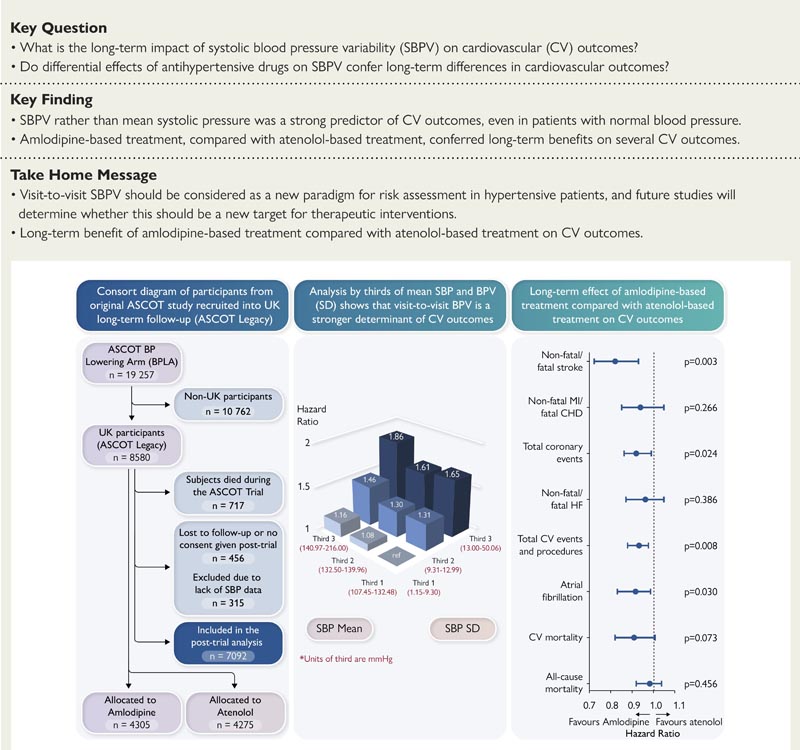Inherited benefits of blood pressure treatment on cardiovascular events are primarily mediated by increased blood pressure variability: the ASCOT trial Summary Background and objectives Intervisit systolic blood pressure (SBP) variability is an important predictor of cardiovascular (CV) outcomes. The long-term effect of a period of blood pressure (BP) control, but with differential systolic blood pressure (SBP) variability, is uncertain. Morbidity and mortality follow-up of UK participants in the blood pressure lowering arm of the Anglo-Scandinavian Cardiac Outcomes Trial has been extended for up to 21 years to determine the CV impact of systolic blood pressure control (SBP) and systolic blood pressure (SBP) variability during the trial and among those assigned to treatment with amlodipine and atenolol. Methods Eight thousand five hundred and eighty hypertensive participants (4305 assigned to amlodipine ± perindopril treatment and 4275 to atenolol ± diuretic treatment during the trial period (median 5.5 years) were followed for up to 21 years (median 17.4 years), using Linked hospital and mortality records A subgroup of participants (n=2156) was followed 6 years after trial closure with a self-administered questionnaire and clinic visit. The mean SBP and standard deviation from visit to visit during the SBP trial as a measure of systolic blood pressure (SBP) variability was measured using >100,000 BP measurements. Cox proportional hazard models were used to estimate the risk [hazard ratios (HR)], associated with (i) mean SBP and BPV during the trial period, for CV endpoints occurring after end of trial and (ii) treatment randomly assigned to post-randomization events, for the first occurrence of prespecified CV outcomes. Results Using BP data from the trial period, in the post-trial period, although mean SBP was a predictor of CV outcomes (HR per 10 mmHg, 1.14 [95% confidence interval (CI): 1.10– 1.17], P < 0.001}, systolic blood pressure (SBP) variability independent of mean SBP was a strong predictor of CV events [HR per 5 mmHg 1.22 (95% CI 1.18– 1.26), P < 0.001] and predicted events even in participants with well-controlled BP. During the 21-year follow-up, those who received amlodipine-based treatment compared with atenolol-based treatment in the trial had a significant reduction in the risk of stroke [HR 0.82 (95% CI 0.72-0. 93), P = 0.003], total CV events [HR 0.93 (95% CI 0.88-0.98), P = 0.008], total coronary events [HR 0.92 (95% CI 0.86- 0.99), P = 0.024] and atrial fibrillation [HR 0.91 (95% CI 0.83-0.98), P = 0.008]. 0.99), P = 0.030], with weaker evidence for a difference in CV mortality [HR 0.91 (95% CI 0.82–1.01), P = 0.073]. There were no significant differences in the incidence of nonfatal myocardial infarction and fatal coronary heart disease, heart failure, and all-cause mortality. Conclusions
|

Graphical abstract : Blood pressure variability and blood pressure control in the 20-year follow-up of the ASCOT Legacy study. BPV, blood pressure variability; SBP: systolic blood pressure; CHD, coronary heart disease; CV, cardiovascular; HF: heart failure; MI: myocardial infarction; SD, standard deviation.
Comments
Hypertension guidelines should be changed to focus not only on a patient’s blood pressure but also on how it varies from visit to visit , say researchers at Imperial College London . 1
To determine the long-term effects of systolic blood pressure variability on cardiovascular outcomes, the research team used patient records from 7,092 people in the United Kingdom who participated in the ASCOT antihypertensive trial two decades ago and who gave their consent. consent to be followed. 2
The team analyzed all deaths and hospital admissions reported after the trial through January 31, 2019, and found that systolic pressure variation over time was a "strong predictor" of stroke, heart attack and atrial fibrillation.
The findings, published in the European Heart Journal , showed that participants who had an average systolic blood pressure of <140 mm Hg during the original trial but high blood pressure variability (a difference of between 13 and 50.1 mm Hg ) had a 16 percentage point absolute increase in cardiovascular events during the 15-year post-trial follow-up period, compared to those with lower blood pressure variability (1.15 to 9.30 mm Hg): 46% ( 901/1969) and 62% (690/1106).
The researchers noted that people in the lowest blood pressure group (<133 mm Hg) during the trial period had a "31% and 65% excess risk of total cardiovascular events" during the follow-up period if their Blood pressure variability was, respectively, in the range 9.3-13 and ≥13 mm Hg.
They said that although current guidelines dictated that treatment decisions for patients with hypertension should be determined by systolic and diastolic blood pressure levels, their findings indicated that "systolic blood pressure variability between visits is a much more powerful determinant." of cardiovascular problems". result".
Study author Peter Sever, professor of clinical and therapeutic pharmacology at Imperial College London, said: "While doctors were aware of this to some extent, without clinical trials it has been difficult to quantify the risk of blood pressure variability at long-term, or the impact of interventions such as calcium blockers to reduce patients’ risk.”
Sever added: "Most importantly, we need international guidelines for doctors to be updated to reflect these latest findings and include blood pressure variability as an important risk factor for heart attack and stroke."
He also called for more research to determine the "optimal method for capturing blood pressure variability," which he suggested could involve a combination of " office and home measurements ."
Final message Contemporary clinical practice, based on current guidelines, dictates that treatment decisions in hypertensive patients are determined by SBP and diastolic BP levels. Our studies, however, provide strong evidence that visit-to- visit systolic blood pressure (SBP) variability is a much more powerful determinant of CV outcome and that at least half of all CV events in our cohort occurred in those with controlled BP but high systolic blood pressure (SBP) variability . We suggest that the standard deviation (SD) cutoff for systolic blood pressure (SBP) variability of 13 mm Hg or more among those with “BP controlled over a period of time” may itself suggest the need to act on excess risk , although we recognize that this needs to be supported by further research to establish systolic blood pressure variability (SBP) as a new paradigm for determining intervention thresholds and targets. This study also confirms the long-term benefits of amlodipine treatment in reducing the risk of stroke, coronary events, and all CV events. The significant reduction in stroke incidence beyond the end of the trial may be mediated in part by the lower incidence of atrial fibrillation and lower SBP variability associated with amlodipine treatment. The long-term benefits of certain treatment strategies have profound clinical implications. The original ASCOT-BPLA results influenced national and international guidelines for hypertension. The current observations expand the benefits reported in the trial for the amlodipine-based treatment regimen and highlight the increasing importance of visit-to-visit systolic blood pressure (SBP) variability in predicting long-term CV outcomes. |
Bibliographic references
↵ Gupta A, Whiteley WN, Godec T, et al., ASCOT-10 Investigators. Legacy benefits of blood pressure treatment on cardiovascular events are primarily mediated by improved blood pressure variability: the ASCOT trial. Eur Heart J 2024:ehad814. doi:10.1093/eurheartj/ehad814. pmid:38291599 CrossRef PubMed Google Scholar
↵ McDougall C, Brady AJB, Petrie JR Jr.. ASCOT: a tale of two treatment regimens. BMJ2005;331:859-60. doi:10.1136/bmj.331.7521.859 pmid:16223801 FREE Full Text Google Scholar
















